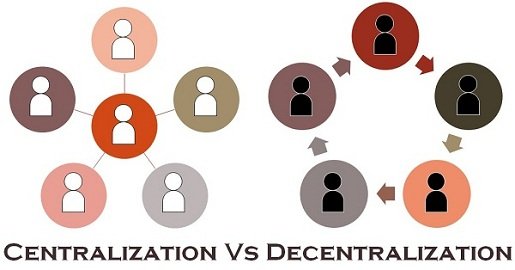Decentralization Is More Important Than Centralization

The difference between centralization and decentralization is one of the hot topics these days. Some people think that centralization is better while others are in favor of decentralization. In ancient times, people used to run their organization in a centralized manner, but now the scenario has been changed completely due to the rise in the competition where quick decision making is required and therefore many organizations opted for decentralization.
The hype around the concept of decentralization is not baseless. Decentralization facilitates diversification of activities, where sub autonomy to constituents can ensure innovation and speedy success tactics. Under overall coordination with the upper management, these sub autonomous constituents can quickly become self-sufficient and profitable. Decentralization also encourages the evolution of employees to capable managers and leaders by boosting personal responsibility and accountability. This is a solution many companies face with the death of managerial talent, which acts as a limiting factor to their growth. An organization cannot expand effectively beyond the scope and abilities of its managerial personnel.
For a growing business, decentralization can facilitate the process of expansion. For example, if expansion results in opening a new business unit in a different geographic area, decentralization allows the new unit to operate as an independent entity, meaning it can react more easily to the specific needs of the area, such as deciding to sell products that appeal to the local market. Besides, employees can be empowered by having more autonomy to make their own decisions, giving them a sense of importance and making them feel as if they have more input in the direction of the organization. It also allows them to make better use of the knowledge and experience they have gained and implement some of their ideas.
As opposed to a decentralized system, a centralized one can become a potential site of attack or become an attacker itself. It is easy for players to collude to benefit themselves at the expense of others in centralized systems.
Decentralization is related to an organizational structure where the top management assigns decision - making responsibilities and daily operations to middle and lower subordinates. This will allow the middle and lower-level managers to prove their managerial efficiency, thus motivating them to enhance their performance. On the other hand, top-level management will start to notice their employees’ potential and capabilities. Besides, it gives the highest hierarchical management to make major decisions with a lot more time for their company.
However, it is important to realize that substantial autonomy is received by every single division in a building. As a result, it is difficult to coordinate the overall activity. This could happen if the substantial workers are not committed enough to their job. Thus, the management should have a good manager in every stage of management to ensure the process of decentralization runs smoothly.
Other than that, every employee takes responsibility for decentralization for the better of the organization so they work harder to achieve all the organizational objectives. In return, they have to be paid more which sometimes proves to be very expensive for the company. This could cause problems in the financial department if substantial workers demand a higher rate of salary. Besides, administration expenses are likely to rise in decentralized enterprises. When it comes to the employment of trained personnel and the availability of physical facilities, every separate department tries to be self-sufficient. This leads to an underuse of facilities and duplication of functions. Such characteristics make decentralization suitable only for large organizations.
When it comes to resolving conflicts for example when the organization is shrinking, centralizing may be the better option. According to Goran Lindah, former CEO of highly decentralized ABB stated that we often need to choose centralization when an organization is dropping off. It is not impossible to decentralize during this event but it is hard to make people agree to give up things or jobs. It is better to hand the orders from the top management to the middle and lower subordinates during the crisis.
To conclude, decentralization holds a great significance and value towards an organization that prioritizes equality and cooperation among workers regardless of their rank. Not only it brings relief to top-level managers, but it also promotes initiatives and creativity in the workgroup and improves teamwork at once.
To counter the downside of this political ideology, there are several steps to create an effective decentralization in a company. According to an article written by Smriti Chand, a pertinent centralization needs to be established for the plans to be formulated so the overall guidance and direction of each part of the company’s activity can be prepared. He also stated that companies that advocate decentralization may face a shortage of managers. Thus, there is a need for the development of managers who possess independent thinking and capabilities for making decentralization effective. Besides, Smriti mentioned that managers are responsible to be up - to - date with both centralized and decentralized managers via communication and coordination so that it matches and integrates with other company units.
References:
https://hbswk.hbs.edu/archive/making-the-decision-to-decentralize
https://www.toppr.com/guides/fundamentals-of-economics-and-management/organising/advantages-and-disadvantages-of-decentralisation/